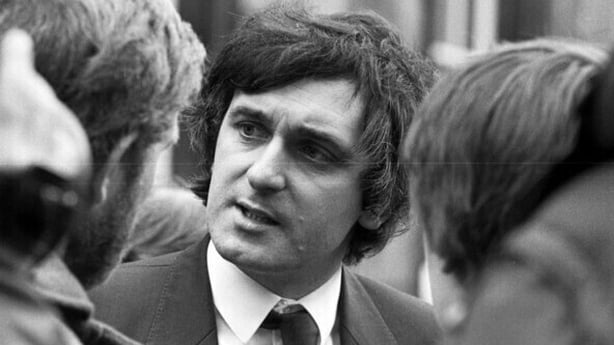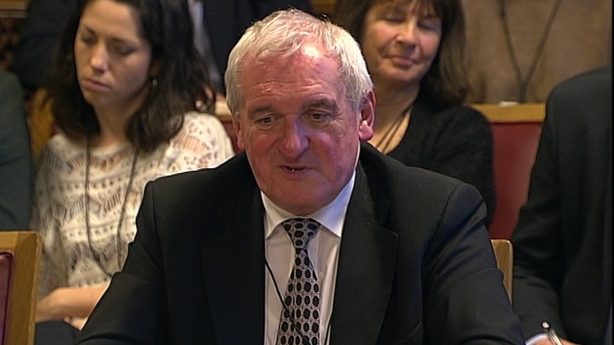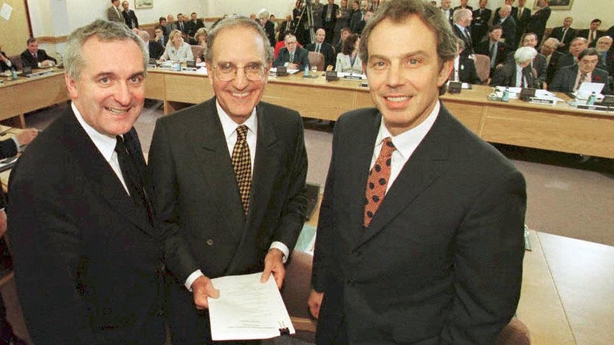Bertie Ahern is genial, charming and personable.
This week his homecoming to Fianna Fáil was a remarkable juncture in his political fortunes.
His legacy as historic peacemaker and popular leader seems to have eclipsed the series of payments revealed by a tribunal investigating planning, which ruined his career.
Public and political anger at his alleged financial irregularities sent him into the political wilderness for some years.
But through media appearances and public events, he has slowly rebuilt his reputation as an expert on the Good Friday Agreement and Brexit.
This week, his application to join Fianna Fáil was welcomed with a standing ovation from members as he spoke at an event in the Dublin Bay South constituency.
It is interesting to note his reputational convalescence occurred just as Fianna Fáil leader Micheál Martin was outside the country on business in Washington DC.

But it is worth remembering why Bertie Ahern resigned as Taoiseach in 2008 and left the party before it considered expelling him.
The Mahon Tribunal tasked with examining payments made to parties or politicians investigated his finances.
Its final conclusion was that Bertie Ahern had failed to honestly account for lodgements of £165,214 Irish pounds or €209,778 made to him or those close to him.
In a damning finding it said: "Much of the explanation provided by Mr Ahern as to the source of the substantial funds identified and inquired into the course of the Tribunal's public hearings was deemed by the Tribunal to have been untrue."
It was investigating whether the funds had come from developer Owen O’Callaghan.
It said: "The purpose of the Tribunal’s inquiries into Mr Ahern’s personal finances was to identify the sources of substantial lodgements and movements of funds into Mr Ahern’s bank accounts, and other accounts associated with him, within a specific time period, and by so doing, establish or exclude a connection between any of these funds and Mr O’Callaghan, either directly or indirectly. Regrettably, the Tribunal’s inquiries were rendered inconclusive."
The payments were made between December 1993 and December 1995.
It is also worth bearing mind that €209,778 is a large sum of money, but it was worth a lot more 30 years ago than it is today.
Bertie Ahern rejected the Tribunal's conclusions and said: "After spending over a decade of inquiries and countless millions of euros, the tribunal has not made - nor could it make - a finding to support the scurrilous and untrue allegation that I had been given a corrupt payment by Mr Owen O'Callaghan."
Mr Ahern stood down as Taoiseach in May 2008, just as the Irish economy was about to plunge into an unprecedented financial crisis.
Looking back, many observers questioned financial decisions made by the three governments led by him.
His tenure as Taoiseach lasted from 1997 to 2008, during which the economy staged a remarkable recovery before the infamous Celtic Tiger years from 2004 to 2008.
Then Central Bank governor Patrick Honohan wrote a report on the banking crisis and said that Government spending doubled in real terms between 1995 and 2007, rising at an annual average rate of 6%.

As the economy was expanding at a faster rate, it meant expenditure in proportion to the economy was stable or falling – in other words, the finances were managed prudently. But that changed dramatically from 2003 on.
After that, as Professor Honohan pointed out, spending began to rise "after output growth began to slow in 2007. And, in a final twist, real expenditure rose by over 11% in both 2007 and 2008, an unfortunate late burst of spending which boosted the underlying deficit at almost the worst possible time."
While the public spending had swung out of control, the State had also been stoking the construction sector with tax incentives.
Investors were encouraged to shelter capital from tax by investing in a dizzying range of construction projects.
Professor Honohan wrote: "At the height of the boom, in 2004-06, schemes existed for urban renewal, multi-storey car parks, student accommodation, buildings used for third-level educational purposes, hotels and holiday camps, holiday cottages, rural and urban renewal, park and ride facilities, living over the shop, nursing homes, private hospitals and convalescent facilities, sports injury clinics and childcare facilities."
In tandem with a property boom and a credit bubble, the balance sheets of the banks ballooned.
It all came to a dramatic halt with the September 2008 bank guarantee, which put the taxpayer on the hook for the liabilities of the banks.
When the public bailed out the banks the burden became too much and as a result, the country had to be bailed out by the European Union and International Monetary Fund in November 2010.
During his tenure as Taoiseach, a policy of light touch regulation allowed enormous over-expansion of the four Irish banks and two building societies.
Not all of this can be blamed on Bertie Ahern. If it was one person’s fault it would have been a lot easier to fix.
But many of the seeds of the economic collapse were sown while he was leading the country.
His tenure can be seen in two halves: successfully helping the economy exit the doldrums and then not shutting down the expansion when it was getting out of hand.
However, the reason why Bertie Ahern now seems to be an acceptable political figure in the eyes of his admirers, is his historic contribution to peace on the island.
That, despite his faults, remains undiminished.
He is one of the architects of the 1998 Good Friday Agreement – perhaps the single biggest historic event in the lives of people on this island.

He showed true skills as a negotiator, persuader and strategist.
It was not all down to Bertie Ahern, but observers agreed he was a critical part of the process, which was a product of timing, perseverance and a willingness to cut a deal by all players.
Interestingly, he has remained involved. Even while he has been in the political wilderness.
He has kept lines of communications open with unionists and nationalists, while talking to the British and Irish governments.
For a retired politician, his diary seems to be quite full these days.
On Thursday night, he told reporters: "I was in Brussels last night with [Northern Secretary] Chris Heaton-Harris...I was up North today, so my concentration will be on the North trying to get the institutions up and running the whole issue around Brexit.
"I’ve been up and down the country, particularly since 2014. I’ve been to conferences on Brexit in all the border counties, huge meetings in Cavan, Monaghan in Donegal. I’ve done commemorations in Wexford, in Cork. Next week I’m with Ibec. I consider this my public service."
There is now speculation about whether he might contemplate putting his name forward for the presidency in 2025.
With so many unanswered questions about his personal finances, it is difficult to see how any campaign would not be dominated by the findings of the Mahon Tribunal.
Whether or not he does consider running for Áras an Uachtaráin, his place in history is secure.







